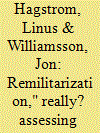| Srl | Item |
| 1 |
ID:
139032


|
|
|
|
|
| Summary/Abstract |
In July 2014, Japanese Prime Minister Shinzo Abe announced that his cabinet had approved a reinterpretation of the country’s constitution. Although Article 9 of the document, effected in 1947, stated that Japan had forever renounced war as a sovereign right, the change meant that the Japanese Self- Defense Forces (JSDF) would, for the first time since their founding in 1954, be permitted to participate in acts of collective self-defence (generally understood to be the right to use force to repel an armed attack against a foreign country that has a close relationship with one’s own country). Abe’s historic plan sparked criticism from China and South Korea, two countries affected by Japanese aggression during the Second World War. Both countries issued warnings about the resurgence of Japanese militarism, amid growing concerns that both China and Japan were leading an arms race in East Asia.
|
|
|
|
|
|
|
|
|
|
|
|
|
|
|
|
| 2 |
ID:
091582


|
|
|
|
|
| Publication |
2009.
|
| Summary/Abstract |
This article analyzes Japanese foreign security policy and recent talk of "remilitarization." It does so by assessing the changes that most closely parallel the analytical interests of three sets of major international relations theories: namely capability (realism), policy (liberalism), and normative context (constructivism). Japanese responses to recurring North Korean missile tests moreover provide a source for a contextually bound analysis of policy and self-image. The article confirms that the last two decades have witnessed a number of important changes in security aspects of Japanese foreign policy but concludes that these changes are not nearly so dramatic as to justify the bold language of many Japan specialists. Hence, it serves to moderate the scholarly tendency to overemphasize or overly dramatize the changes in Japanese security policy.
|
|
|
|
|
|
|
|
|
|
|
|
|
|
|
|
| 3 |
ID:
108535


|
|
|
|
|
| Publication |
2011.
|
| Summary/Abstract |
After the end of the Cold War, Japan became very active in its security policy. How
can we explain this phenomenon? This essay argues that (neo-) realist settings
(the end of the Cold War, the Taepodong missile launch) have triggered changes
in Japanese domestic security culture, which subsequently affected Japanese
security policy. In spite of rationalist theorists' criticism of the constructivist
approach for not being able to clarify independent and dependent variables, this
essay attempts to elucidate the relationship between security culture and policies
thereof. By utilizing "cultural process-tracing," this paper investigates how cultural
elements become linked and internalized into policymaker-level and illustrates
the causal relationship between these two.
|
|
|
|
|
|
|
|
|
|
|
|
|
|
|
|